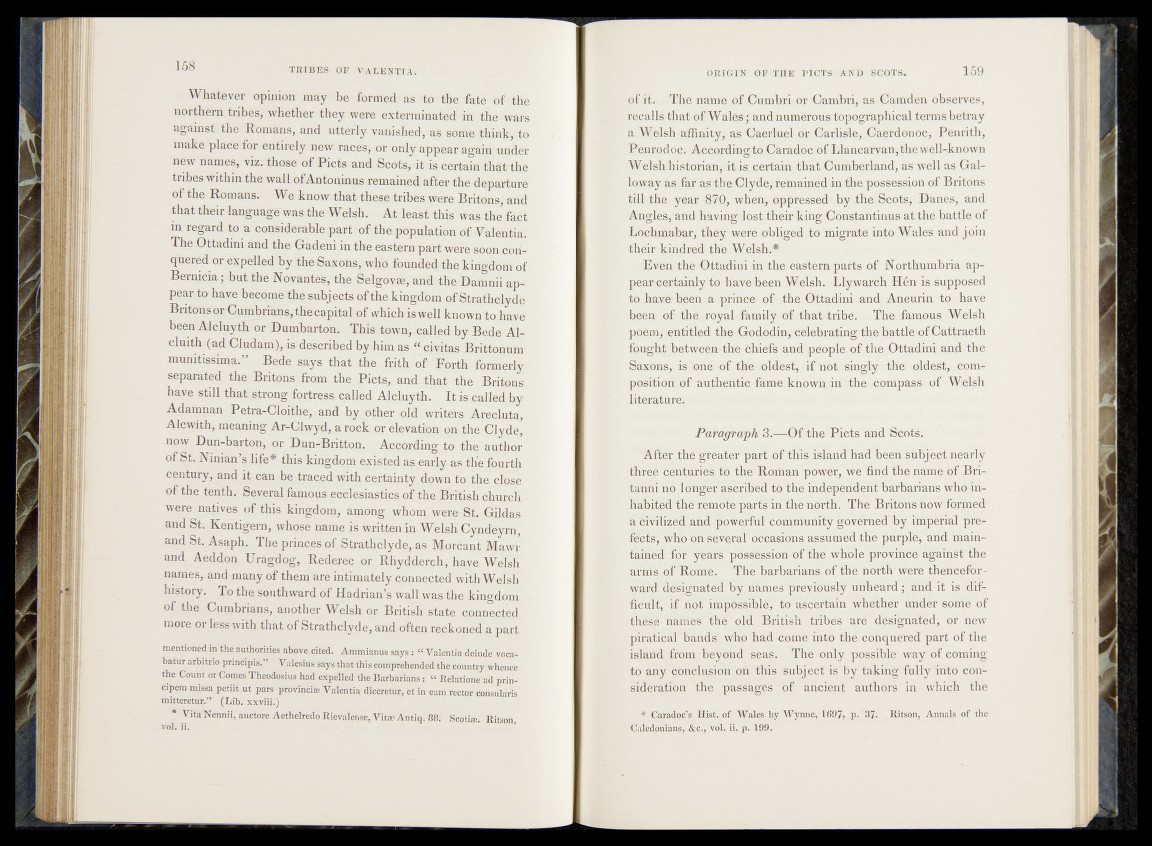
Whatever opintan-mRf he formed a s . to the fate of the
northern tribes, whether they'Were exterminated in the wars
against the Romans, and utterly vanished, as some think^.to
make place for entirely new races, or only appear again tfrider
new names* viz. those of Piets and Scots, it is-eertaih tHatthe
tribes within the wall of Antoninus remained after the departure
of the Romans. We know that these tribes were Britons, and
that their language was the Welsh. At le a st this was the" fact
m regard to a considerable jmrtiof the .population of Valentin.
The Ottadim and the Gadeni in the eastern part'were sbo&^ii-
quered orexpeiled by the Saxons,^who founded the kingdom of
Bernicia; but the No1«antes, the Selgovee, and the Damnii appear
to have become the subjects of the kingdoin of Strathclyde
Britons or Cumbrians, the capital of which is well known ±o;Kave
been Alcluyth or Dumbarton. This town, called by Bede Al-
eluiih (ad Cludam), is described b y hinfas^Wivitas Brittonum
munitissinra.” Bede says that the frith 'of 'Porihf formeriy'
separated" the Britons from the Piets, amLthat the Britons
have still tha%trong fortress; called Alcluyth. It i&^lledtby
Adamnan Petra^CIoithe, and by other old writers' Ateglu-ta,
Alcwith, meaning Ar-Clwyd, a rock or elevation on the plydq,
-now Dun-barton, or Dun-Britton. —According to the author
GfBfcNinian’s life* this^kmgdom existed as early asd lie^q rth
century, and it can be traced with certainty down to the,
of the tenth. Several famous ecclesiastics of the British church
were natives: ofThis kingdom, among whomTwere'St..Gildas *
and St. Kentigern, whose name is,written in WelshGyndbyrn,
and St.; Asaph. Theprihce^of Strathclyde, as Marcant Mawr
and Aeddon IJragdog, Rederec or Rhyddereh, have W & i
names, and many of them are intimately connected with Welsh
history. To the southward of Hadrian’s wall was the kingdom
of the Cumbrians, another Welsh or British state, connected
more or less with that of Strathclyde, and often reckoned a part
mentioned in the authorities above cited. Ammianue-aays: Mjalentia deinde voca-
batnr arbitrio pnncipis.” Valerius says that this comprehended thecountry whence
the Count or Comes Theodosius had expelled the Barbarians: f Relatione ad prin-
cipem missa petiit ut pars provinciae Valentia diceretur, et in earn rector eonsularis
mitteretuf.” (Lib. xxvfii:)1
* VitarNenhii, auctore Aethelredo Rievalense, Vitae Anti<j. 88. Seotiffl, Riisoil
vM. ii._
©f,j|pl| The name of Cumbriior,pîambri> a t Gamden observes,
recalls th a fo f Wales y and ntinaeroustopographical terms betray
a Welsh affinity,,as Caerluel om Carlisle*. Caerdonoc, Penrith,
P e n rAo cG T i d i n g i t o Caradsc -of Llancarvan, the well-known
Weigh historian, it asce rta in thattGumberland^as well as G ab
lǤiw ay, :as-Mar.sas:th e Clydepremained in the possession of Britons
till theuÿë^r^îS^^ wbén,; oppressed*} by the'/Scôts, Danes, and
Angles, and baving/d'O^ktheiwking'tConstantmus’a t the battle of
boeb-mabar, they-.were /obliged. toribigrate into Wales and join
th®içi: kind red the Welsh.*
Ottadini in the,* eastern patts of Northumbria ap-
peapëerlaMly >tp h aweb een ? Welsh. blywarch H en ife supposed
th e Ottadini and Aneurin:;jtor- Jiave
been of th e royal familytofethat tribe.' The famous Welsh
Gododin, célebrating the battle«©! Gattraeth
f l ig h t between the, chiefs -andqabopfle,ipf the Ottadim and th e
Saxons, ‘isilénë .';bf»flm^!©lde-si%, if nnfysi&glÿ- the oldest* composition
of ^authentic fame known in theltcompass of Welsh
literature. <
Paragraph 3.—Of the Piets and Scots1.
After,thCgf|f|ter part of thiln|land had been subject,nearly
wrap cliifuriel"'to the Roman power, we find the name of Bri-
tahriî noTong'er ascribed to the independent barbarians who inhabited
tne remote'parts in the north. The Britons how formed
a civiuze'aand powerful community gôvernëd by' imperial prelects)
wlio bnueveral occasions assumed the purple, and maintained
for ’ years possession of the whole provinbe'against the
arms of Roméf The barbarians of the north were thenceforward
designated bÿ names previous! ƒ "unheard ; and it "is- difficult,
if not impossible, to“4ascertain whether under sonie of
these names the old British tribe’s tire designated, or new
piratical "Bands who had come intb the conquered part of the
island from beyond seas;; The only possible way of coming
to any conclusion on this subject is by taking fully into con^
sideration the passages of ancient authors in which the
* Caradoc’s Hist, of Wales by Wynne, 1697, p.. '37. Ritson, Annals of the
Caledonians, &c., Vol. ii, p. 199.